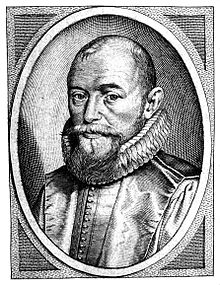Simon Episcopius
| Simon Episcopius | |
|---|---|

Simon Episcopius, c. 1630
|
|
| Born | January 8, 1583 Amsterdam, Netherlands |
| Died | April 4, 1643 (aged 60) Amsterdam, Netherlands |
| Theological work | |
| Era | 17th century |
| Tradition or movement | Arminianism |
| Main interests | Soteriology |
Simon Episcopius (January 8, 1583 – April 4, 1643) was a Dutch theologian and Remonstrant who played a significant role at the Synod of Dort in 1618. His name is the Latinized form of his Dutch name Simon Bisschop.
Born in Amsterdam, in 1600 he entered the University of Leiden, where he studied theology under Jacobus Arminius, whose teaching he followed, and Franciscus Gomarus. He graduated M.A. in 1606, but his appointment as a minister was questioned from the Calvinist side. He went to the University of Franeker, where he heard Johannes Drusius. In 1610, the year in which the Arminians presented the Remonstrance to the states of Holland, he became pastor at Bleyswick, a village near Rotterdam; in the following year he advocated the cause of the Remonstrants at The Hague conference, and again at Delft in 1612.
In 1612 he became professor of theology at Leiden; his appointment awakened the bitter enmity of some the Calvinists. He was attacked by Festus Hommius in Specimen controversiarum Belgicarum (1618).
At the Synod of Dort in 1618, Episcopius was chosen as the spokesman of the thirteen representatives of the Remonstrants before the synod; but he was refused a hearing. At the end of the Synod's sittings in 1619, Episcopius and the other twelve Arminian representatives were deprived of their offices and expelled from the country.
Episcopius retired to Antwerp and ultimately to France, where he lived partly at Paris, partly at Rouen. He devoted most of his time to writings in support of the Arminian cause; but the attempt of Luke Wadding to convert him to Catholicism involved him also in a controversy. After the death (1625) of Maurice, prince of Orange, the violence of the Arminian controversy began to abate, and Episcopius was permitted in 1626 to return to his own country. He was appointed preacher at the Remonstrant church in Rotterdam and afterwards rector of the Remonstrant college in Amsterdam, where he died.
...
Wikipedia
